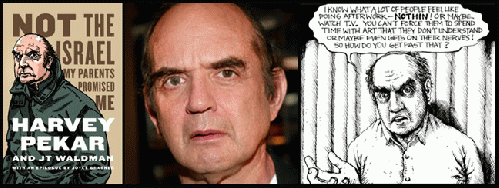NOT THE ISRAEL MY PARENTS PROMISED ME
By Harvey Pekar and J.T. Waldman
With an epilogue by Joyce Brabner
Hill and Wang, 2012
$24.95. $14.67 on Amazon
Harvey Pekar, who died in 2010, was a major player in the elevation of comics into a respectable medium for telling human stories. His famous American Splendor comic featured Pekar as an existential everyman/curmudgeon finding stories in chance meetings in the grocery line, in his mundane, day-to-day life as a file clerk in a Cleveland VA office or in his celebrated appearances on the David Letterman show. His image has been drawn by dozens of cartoonists in a range of styles, most notably by the famous R. Crumb. A feature film was made about Pekar's life and work called American Splendor. The hybrid narrative/documentary film won an Oscar for its screenplay.
Pekar has a strong following and is still publishing graphic narratives beyond the grave. The new comic titled Not the Israel My Parents Promised Me is an example of his post-mortem work. The 172-page graphic tale was written by Pekar and has been illustrated by Philadelphia artist J.T. Waldman, whose other work includes a highly regarded graphic narrative of the Biblical Esther story called Megillat Esther.
Bruce Farrar on Amazon's website says this of Waldman's Esther book: "A daring and imaginative interpretation of scripture in a graphic novel is JT Waldman's version of the Scroll of Esther, the story behind the Purim festival. "This is a cup that runs over its brim with delights, wonders, and mysteries."
The Pekar book on Israel is comprised of three narrative lines. First, there's Pekar's story raised in Cleveland by a father who owned and operated a small grocery store and a mother who was a devoted Marxist; both parents were strong Zionists. Second, there's Pekar's telling of Jewish history from Abraham to the Crusades to the British Mandate to the founding of Israel. The third narrative thread is based on the time Waldman met Pekar and drove him around Cleveland before Pekar died.
Much of the narrative is framed by the conversation between the two men (one old, one young) during the drive through Cleveland,. Fittingly, the drive begins at a huge used book store and ends at a public library. This is a apt frame because Pekar was a notorious bibliophile who haunted used book stores and libraries during his lifetime and amassed a vast library of his own in his home, which he shared with his wife and professional collaborator, Joyce Brabner.
I met Pekar once about 15 years ago when he visited Philadelphia for an interview. My wife, Lou Ann Merkle, is from Cleveland and knew both Harvey and Joyce. Back in the 1980s, Lou Ann co-produced with Brabner a comic book called Real War Stories that told a handful of tales about anti-war veterans.
One of the things that impressed me then about Harvey -- beyond his eccentric, sometimes grumbling manner -- was his formidable range of reading. The man was a sponge for ideas and information. At the time, I had been collecting and reading Latin American literature. Once Harvey heard that, without skipping a beat, he ticked off the famous Latin American Boom writers he was familiar with. But then he went on to cite the works -- such as Epitaph of a Small Winner -- that he had read of the 19th-century Brazilian novelist Machado De Assis. Few Americans are aware of De Assis, let alone read his works. Pekar was also a devoted jazz aficionado who reviewed jazz for a number of publications.
The scales fall from Pekar's eyes following the Six Day War. Immediately after the June 1967 war, after Israel takes the Golan Heights, the West Bank and most of the Sinai Peninsula in an amazing military action, Pekar is still four-square behind Israel. "I gotta say I was proud of Israel then. They'd taken on huge odds and beat them."
Then, as he's shown pushing his VA file clerk cart around the VA warehouse, he says, "But I couldn't stop thinking about the valid points my leftist friends had." By the 1970s, under Prime Minister Menachem Begin, he becomes aware it has become policy to move Jewish settlers into the occupied territories. This is where the questions begin to arise.
At this juncture, Pekar is drawn barefooted in a wife-beater t-shirt sitting in a chair reading a newspaper, a cup of coffee on the table next to him and a cat and a box of records on the floor next to a small file cabinet with a phonograph player on top.
"This is really a stupid thing to do!" he says of the settlement policy. "It's sabotaging their best chances for lasting peace."
This juncture is exactly where I first questioned the wisdom of our ally Israel. In June of 1967, I was serving in Vietnam as a radio-direction finder in the area west of Pleiku. I vividly recall standing in the middle of my company's headquarters in the Fourth Infantry Division base camp west of Pleiku discussing (or arguing) with a Jewish friend about the notion of Jews owning and settling the occupied territories. In his view, it was the spoils of war, and it was all somehow reinforced by the Bible. I uttered a lot of statements that began with: "Yes, but -- or "OK, sure, but don't you think-- The momentum of the tanks and aerial bombardments was on his side.
In Vietnam, I was not particularly attuned to an antiwar message. I didn't appreciate the nuances and complexities of imperial arrogance. But I clearly recall feeling something was terribly wrong about the notion of Israeli Jews settling the areas they had just taken. So Harvey Pekar's feelings at that juncture make great sense to me, as they made great sense to a lot of people at the time. The trouble was -- and is -- these very human questions and feelings were seen as "leftist" and, thus, dismissed in favor of the tanks and the strategic bombers of the right.
The beauty of Pekar and Waldman's collaborative book is that the ideas, the history and the questions are posed without shrill rhetoric or demands for action. While I'm a WASP and not terribly well versed in the history of Jewish ideas, it seems to me there is a long history and tradition of secular Jewish narrative and scholarship that emphasizes human suffering and the foibles of power politics -- in favor of the ordinary, everyday schmuck or schlemiel lost in the swirling vortex of history and experience. It seems to me one might argue that the State of Israel is in fact a response to this moral and aesthetic vein of humility -- as in, "Nevermore will we be taken as morally sensitive, bumbling fools and losers!" This raises the danger of throwing the baby out with the bathwater, the baby being a highly moral sense of shared humanism.
Many of my intensely pro-Israel Jewish friends would tell me I'm way over my head, here. One such friend is a very progressive, anti-war Democrat when it comes to anything other than Israel. Last week, when I sent him a notice of an exhibit of Waldman's drawings from the Pekar book at the Gershman Y in Philadelphia, his response was typically harsh and accusative of me.
(Note: You can view every article as one long page if you sign up as an Advocate Member, or higher).





